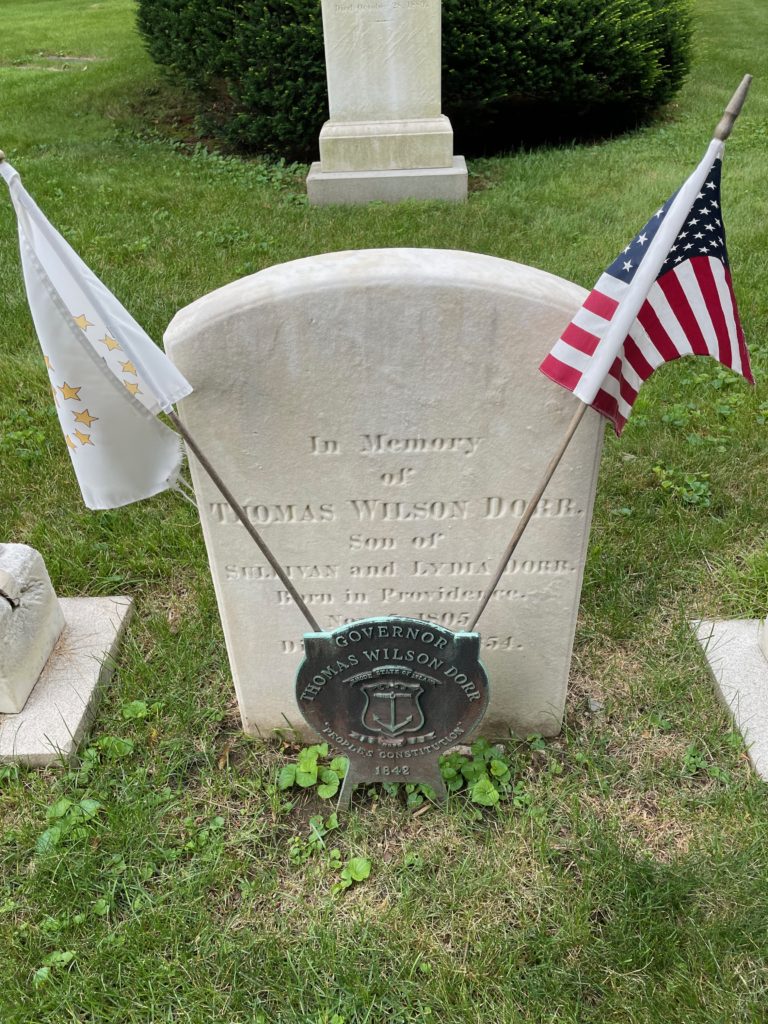Erik Visits an American Grave, Part 925
This is the grave of Thomas Dorr.

Born in 1805 in Providence, Dorr grew up in a wealthy family of the Industrial Revolution. His father was a big time textile manufacturer and had his own mill town. So Dorr had all the luxuries, for the early 19th century anyway. That included being sent to Phillips Exeter and then Harvard, where he graduated in 1823. He then moved to New York to study the law and passed the bar in 1827.
Dorr moved back to Rhode Island and got involved in politics. In 1834, he was elected to the state legislature. Now, Rhode Island was the nation’s most conservative state in the 1830s. The Federalist period was gone but Rhode Island remained locked in an early 19th century politics that resisted all change. That it was so small and lightly populated (especially in the decades before waves of immigrants to work the mills transformed the state’s politics) helped contribute to this inherent conservatism. The rise of Andrew Jackson to the presidency was a direct slap in the face to the values held by the Rhode Island elite. We were a long ways from the highly educated elites of the Founding Fathers. Jackson could barely spell after all.
So while the rest of the nation responded to all this by opening up universal white male suffrage, Rhode Island’s governing class refused to do so. In fact, it would be the very last state. And this brings us back to Dorr. Despite being a rich guy himself, Dorr did not like this revanchist vision of white male suffrage. Rhode Island was super reactionary. Not only did it still have the old property requirements to vote, but each town got the same number of state representatives, which meant that growing industrial cities such as Providence and Pawtucket had no power. It was like the modern U.S. Senate, but even more undemocratic. In 1834, Dorr won a seat in the statehouse and this is what he faced. He became one of the faces of suffrage reform in the state. On a national level, the wind was at his back. In Rhode Island, it was not. He led a convention that year held in Providence to demand universal male suffrage. But the legislature didn’t care and just ignored it. He kept getting reelected to the legislature, but it didn’t matter. The state’s conservative masters had no reason to change. And it was such a small, irrelevant state that national authorities just didn’t really care what happened here (obviously things have changed a lot today….) By 1841, Rhode Island still ran with its pre-1776 colonial constitution, which it refused to update.
So, with this stalemate and a conservative legislature so reactionary as to be decades behind the rest of the nation, a challenge to the state government began with Dorr at its head. In 1840, a People’s Party formed that voted on a new state constitution. Of the 14,000 or so people who voted, only 5,000 were actually eligible voters according to the state. This scared the legislature enough to agreed to change the state constitution and so they submitted some moderate reforms to the state. But voters rejected it, deciding it did not go far enough. Then there were two elections for governor in 1842, one from the People’s Party and the other from the state establishment that called itself the Law and Order Party. Dorr won the first and declared himself governor. For the conservatives, he was committing treason against Rhode Island and must be suppressed. And indeed he was.
Both sides appealed to President Tyler for recognition. Tyler had no interest in this at all. After all, how was any of this going to expand the nation’s slave power or get him elected to his own term in 1844, which were the two things he did care about. So he did nothing. Law and Order governor Samuel King then wanted Dorr arrested and placed on trial for treason against Rhode Island. Dorr fled the state. His followers faded away. King offered $5,000 for Dorr’s capture. He briefly raised troops in New York for what became known as Dorr’s War and hoped to have a battle near Chepachet, Rhode Island, but clearly outmatched, the troops ran away. The state did change the constitution finally in 1843. So Dorr returned from his New Hampshire exile (where he was protected by a friendly governor) and thought everything would be forgiven. Nope! King had Dorr arrested. He stood trial. And this was no soft deal. This was really meant to punish Dorr for breaking open the reactionary politics of the state. The state Supreme Court, meeting in the reactionary center of Newport, sentenced him to life at hard labor and solitary confinement!!!
This absolutely bonkers sentence reignited the outrage against Rhode Island conservatives. A popular movement erupted and the court overturned his sentence. But by that time, he had done a full year of hard labor. Hard labor was hard. You were not intended to live long. These sentences existed to work you to death. Dorr’s body was broken after that year. He was sickly for the rest of his too short life. Dorr died in 1854. He was 49 years old. His legacy was still hotly contested at that time. In 1854, the state legislature overturned his conviction entirely, which led the state Supreme Court to invalidate that ruling as unconstitutional. It was all dropped when Dorr died though.
Thomas Dorr is buried in Swan Point Cemetery, Providence, Rhode Island.
If you would like this series to visit other politicians involved in the democratization movements of the early 19th century, you can donate to cover the required expenses here. Thomas Hart Benton is in St. Louis and Henry Hubbard, the New Hampshire governor and ally of Dorr, is in Charlestown, New Hampshire. Previous posts in this series are archived here.


